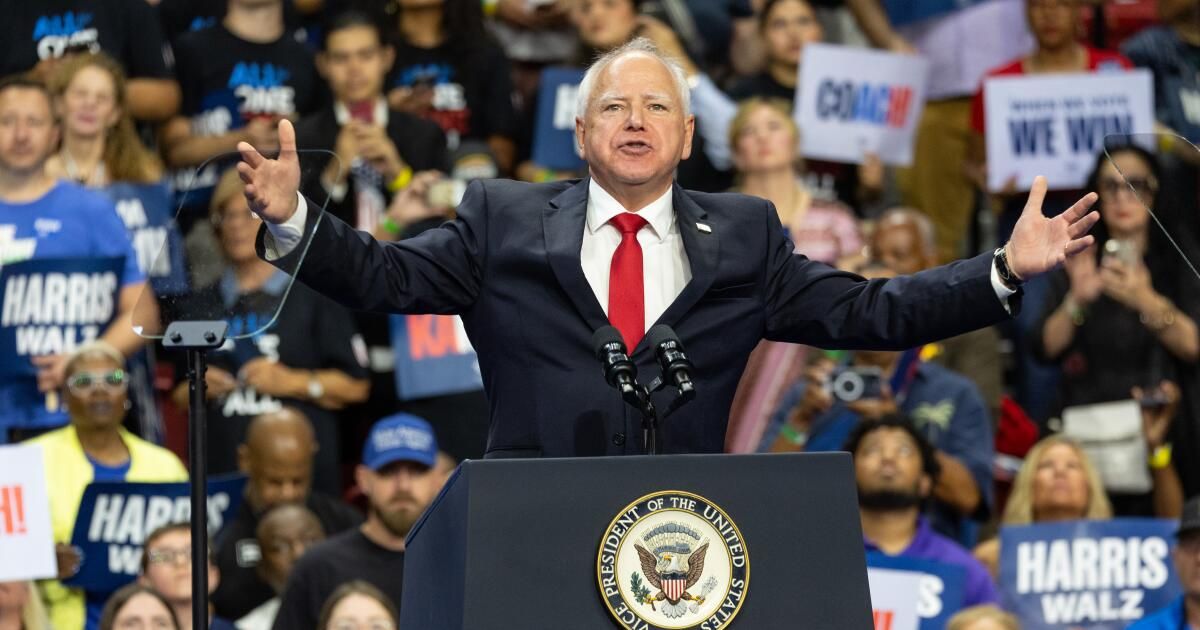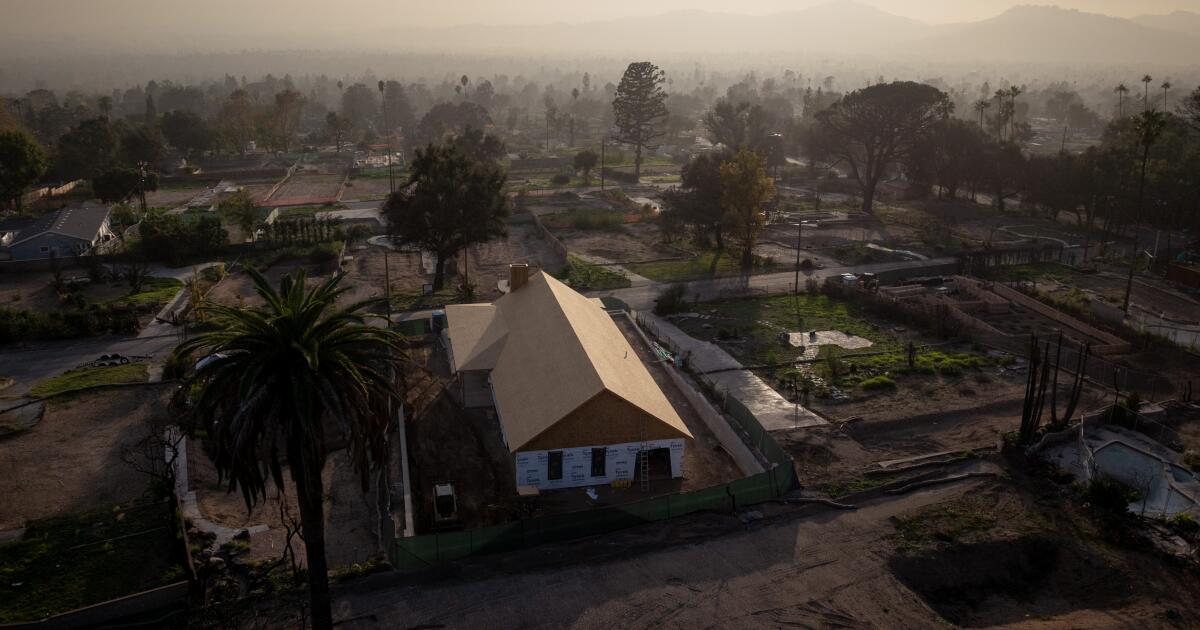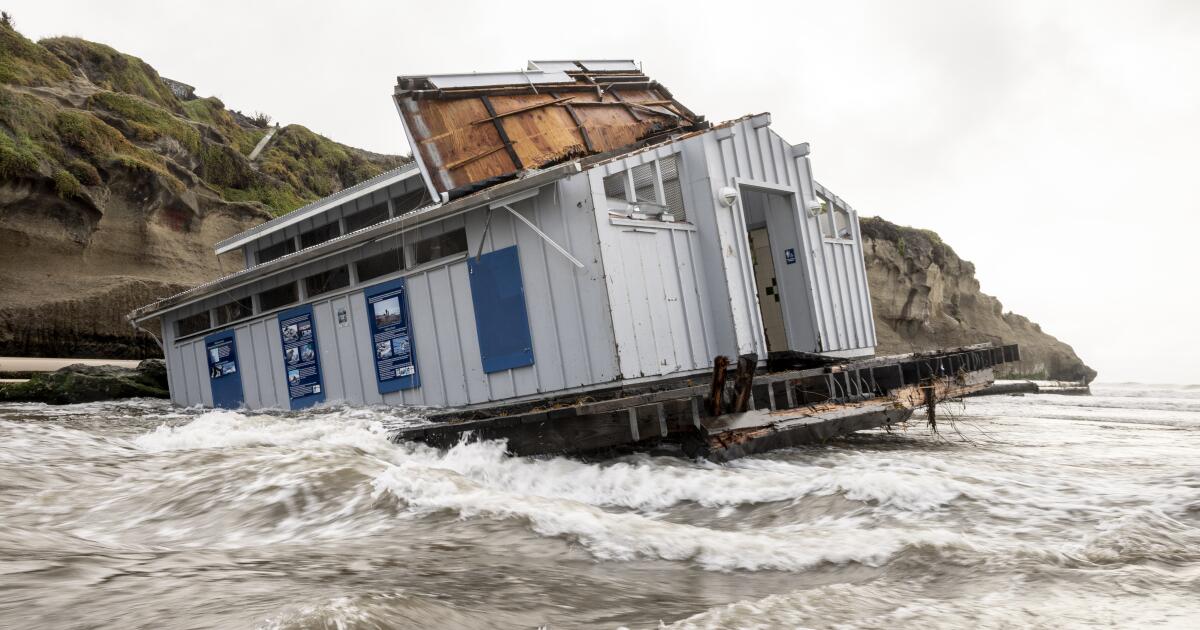The run-up to the 2024 presidential election has been rife with contentious issues, from abortion to immigration. But for many voters, climate change remains a top-of-mind concern as the country continues to grapple with devastating storms, explosive wildfires and record-breaking heat waves.
Vice President Kamala Harris’ Democratic running mate, Minnesota Gov. Tim Walz, has an impressive record on climate action, experts and advocates say. During his tenure as governor, Walz has passed dozens of initiatives focused on clean energy and transportation, air and water quality, and environmental justice — many of which mirror California’s ambitious goals.
“California’s reputation as a climate leader is well-deserved, and Walz is a perfect example of that,” said Mike Young, political and organizing director for California Environmental Voters.
“It’s actually a great match because at the top of the ticket is someone from California who has also been a champion,” he said, referring to Harris’ own climate record. “And climate, clean energy and environmental justice are key areas where they should continue to lead nationally, and certainly in California and Minnesota they should continue to lead.”
Aggressive and shocking reports on climate change, the environment, health and science.
Minnesota’s transition to clean energy and reducing the state’s fossil fuel emissions have been among Walz’s top environmental priorities as governor. His Climate Action Framework, released in 2022, notes that “climate change is an existential threat to all Minnesotans.”
Among its stated goals are halving Minnesota's greenhouse gas emissions by 2030 and achieving carbon neutrality by 2050. (California has set a similar goal of achieving carbon neutrality by 2045.)
To accomplish this, Walz has worked to accelerate renewable energy projects in the state, including recent legislation to streamline the permitting process for wind and solar projects by up to 12 months.
What's more, Walz's plan would require Minnesota utilities to generate 100% of their electricity from carbon-free sources by 2040, a goal that is “even more ambitious than similar measures in traditionally progressive states,” according to Cassidy DiPaola, communications director for the nonprofit Fossil Free Media.
“Governor Walz’s evolution as a climate advocate, fueled by witnessing the impacts of extreme weather on his rural constituents, reflects a growing understanding of climate change as an immediate and devastating threat to communities across America,” DiPaola said in a statement.
Walz also signed an executive order in 2019 that established a climate change subcabinet in the state, which is tasked with identifying new strategies to meet greenhouse gas reduction goals and “prepare Minnesota for the impacts of climate change that cannot be avoided or mitigated.”
Since the passage of President Biden’s signature climate bill, the Inflation Reduction Act, in 2022, Minnesota has seen $1.15 billion in clean energy investments and nearly 2,000 new clean energy jobs, according to an assessment by the Climate Power group.
But energy is just one component of Walz’s environmental record. The governor has also strongly advocated for transportation projects that would expand the use of electric vehicles, tighten pollution standards for cars and trucks and improve public transit and electric bike options.
Last year, Minnesota became the first Midwestern state to adopt California’s strict emissions standards, despite significant opposition from state Republicans and the Minnesota Automobile Dealers Association, who lamented in a court petition that “Minnesota is not California.”
The Clean Cars Minnesota rule went into effect this year after a lengthy legal battle and requires automakers to build and deliver passenger vehicles that produce less pollution and to deliver more zero-emission vehicles to the state for consumers to purchase.
The rule stops short of banning the sale of gasoline-powered vehicles, which California will do starting in 2035. But Walz has outlined other plans to speed Minnesota’s transition to electric vehicles, and his climate framework calls for expanded EV charging infrastructure, lower EV costs and more affordable EV options. The plan calls for at least 20 percent electric vehicles on Minnesota roads by 2030.
Young said it makes sense for Walz to look to Harris’ home state for inspiration, and that doing so speaks to his strength as a public servant who makes decisions based on what best serves the people.
“I don't think he cares where the idea comes from if it's a good idea,” Young said. “If California has some great environmental ideas, why limit them to California?”
This year, Walz requested $39 million in federal funding from the U.S. Environmental Protection Agency to help connect Midwestern states through an electric truck charging network for heavy vehicles. His transportation funding bill, passed in 2023, is also expected to generate $440 million a year aimed at improving public transit and accelerating the construction of an electric bus system.
But Minnesota, a Great Lakes state home to thousands of waterways, has also prioritized protecting clean water and air under Walz's watch.
Last year, the governor signed a $2 billion environment and climate bill that includes the nation’s strictest rules on PFAs, or “forever chemicals.” The bill includes environmental justice initiatives, such as requirements for the Minnesota Pollution Control Agency to take past pollution into account when issuing new or renewed air permits.
Additionally, Walz’s 2024 budget calls for more than $215 million in investments in water and transportation infrastructure for programs such as lead pipe replacement, nitrate monitoring and removing PFAs from drinking water.
But its climate record is not without its blemishes.
A report released this month by the group Heated focused on a crude oil pipeline project that was approved early in Walz’s term as governor. The pipeline runs through protected indigenous lands as well as lakes, rivers and other waterways in the state, and indigenous leaders told Heated they viewed the project’s advancement as a betrayal of past promises.
Others, however, remain optimistic about Walz's ability to boost the presidential bid on climate efforts.
“As governor, Tim Walz has made great strides to address the climate crisis,” read a statement from Stevie O’Hanlon, communications director for the Sunrise Movement. “He has done so by promoting climate action as a way to improve people’s everyday lives, create good-paying green jobs, and invest in strengthening communities.”
Indeed, Walz’s ability to communicate effectively about global warming has been a strong point on the campaign trail. During a “White Dudes for Harris” fundraising call in July, watched by more than 200,000 people, he criticized the Republican ticket for “not addressing climate change that will affect communities that are less fortunate than everyone else.”
“We have communities that are going to pay the price because we didn’t address the problem,” Walz told the audience.
The comments stand in stark contrast not only to those of Donald Trump, who installed climate change deniers in his administration and sought to roll back more than 100 environmental regulations during his presidency, but also to those of his running mate, Ohio Sen. JD Vance, who has called electric vehicles a “scam” and said he does not believe there is a climate crisis.
“Voters will have a clear choice between a Harris-Walz ticket, which will fight for our clean energy future that reduces harmful pollution and creates safer communities, or a Trump-Vance administration whose extreme, pro-pollution MAGA agenda will give Big Oil a free pass to profiteer and pollute,” reads a statement from Lori Lodes, executive director of Climate Power.
Walz also maintained environmental stances during his time in Congress, where he served in the House of Representatives from 2007 to 2019 before becoming governor of Minnesota.
In 2017, he condemned Trump’s decision to withdraw from the Paris climate agreement as a move that “undermines American national security, food security, moral and global leadership, and fails our children” (President Biden rejoined the agreement on his first day in office).
Among Walz's votes at the time were opposition to legislation to remove public lands protections, opposition to a bill to expand offshore oil drilling and opposition to a bill to prohibit the federal government from establishing basic protections against fracking.
Walz also minced no words when Trump in 2017 revoked a signature Obama-era climate policy known as the Clean Power Plan, issuing a statement denouncing the order for denying “the very existence of climate change.”
“The science on climate change is settled,” Walz said.
Fact Sheet
Towards a more sustainable California
Receive Boiling Point, our newsletter exploring climate change, energy and the environment, and be part of the conversation – and the solution.
You may occasionally receive promotional content from the Los Angeles Times.












